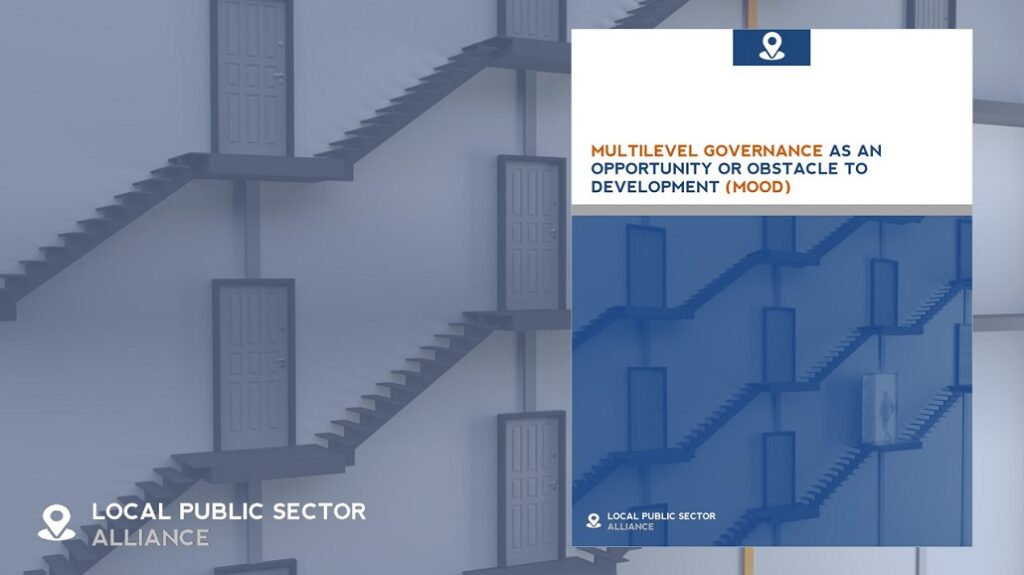
The role that decentralization plays in public sector management around the world is evolving rapidly. Whereas decentralization has traditionally been pursued in countries around the world as a governance reform to increase political competition and public participation, multilevel governance reforms are increasingly understood as critical element in promoting inclusive service delivery, ensuring the efficient use of public finances, and achieving specific development objectives in a resilient, inclusive, and sustainable manner.
In fact, it is safe to say that the global challenges that countries face in the 21st century cannot be dealt with by any single government level alone. This is true whether the problem being faced is growing inequality in wealth and economic opportunity; climate change and the impact of environmental disasters; public health crises or pandemic responses; urban crowding and congestion; gender inequity and social exclusion; or political polarization and the rising threat of authoritarianism. The scale of these challenges is so overwhelming that stakeholders at all levels of government and society need to work together to collectively solve these challenges.
In turn, inclusive and effective multilevel governance systems are needed to ensure that stakeholders at all levels of society can work together effectively to address these challenges. For instance, successful efforts to ensure widespread access to childcare services—in pursuit of gender equality and women’s empowerment—typically requires an effective partnership between national government (who sets the rules and provides subsidies), local governments (who implement subsidy programs and monitor childcare quality), and civil society, NGOs and the private sector (who often operate childcare facilities).
Unfortunately, this means that in countries with ineffective multilevel governance systems, multilevel governance can form a major obstacle (or opportunity) to development. Yet, sectoral specialists or policy advocates not well-versed in decentralization or localization may not even know that they have a multilevel governance problem. At the same time, decentralization and localization experts may not understand the sector or specific policy issue well enough to identify or support their colleagues with the development challenges.
Understanding multilevel governance as an opportunity or obstacle to development
Many global development challenges are being pursued in a top-down manner, with most efforts taking place—and most resources being used—within multinational or national level organizations. This approach assumes that development challenges are macro-problems that can be solved at the global or national level. As a result, few resources have trickled down to the cities, towns, and rural communities where people live and work, and where development actually takes place.
One question that is seldom asked is: can this development challenge be solved in an efficient manner closer to the people? And to what extent does a specific development challenge have an important multilevel governance dimension? Policy makers and policy advocates won’t know the to this question until you consider your development challenge in a multi-level governance perspective.
A MOOD Assessment
The idea of the MOOD assessment framework—the assessment of Multilevel governance as an Opportunity or Obstacle to Development, or MOOD Assessment—is to guide policy makers, sector specialists and/or policy advocates in a particular sector or area of development to systematically identify the strengths and weaknesses of a country’s approach(es) to multilevel governance, decentralization, and intergovernmental relations, and to leverage, whenever possible, a country’s intergovernmental systems to improve the effectiveness of the public sector’s performance in achieving specific development results.
A MOOD assessment is different from other decentralization and localization tools in that it does not start from a specific theory about decentralization or localization, but rather, starts from a specific development challenge. The MOOD assessment framework then asks three questions:
- What is the current role of stakeholders at different levels of the public sector and civil society in addressing the development challenge?
- What more can stakeholders at different government levels do to address the development challenge at hand?
- What opportunities exist to improve the effectiveness of the multilevel governance system to promote resilient, inclusive, sustainable and effective development?
As such, a MOOD assessment is a multilevel governance stakeholder analysis, situation analysis, SWOT analysis, and political economy combined into one, and can form a critical input into achieving policy consensus across different government levels as part of an iterative, adaptive process of policy reform.
The framework was development by the Local Public Sector Alliance (LPSA) and is publicly available to use free of charge.
The framework complements LPSA’s Local Governance Institutions Comparative Assessment (LoGICA) Framework and LPSA’s Intergovernmental Fiscal and Expenditure Review (InFER) framework .
Downloads / Links
Local Public Sector Alliance. 2024. MOOD Assessment framework. (Working Draft, January 2024).
